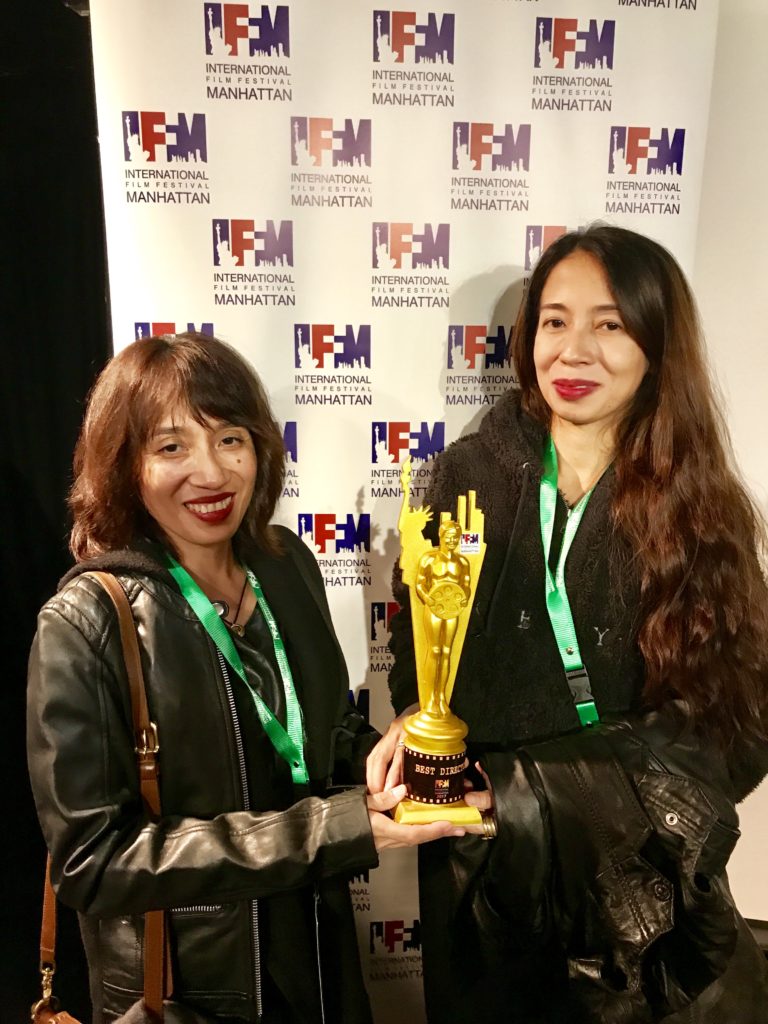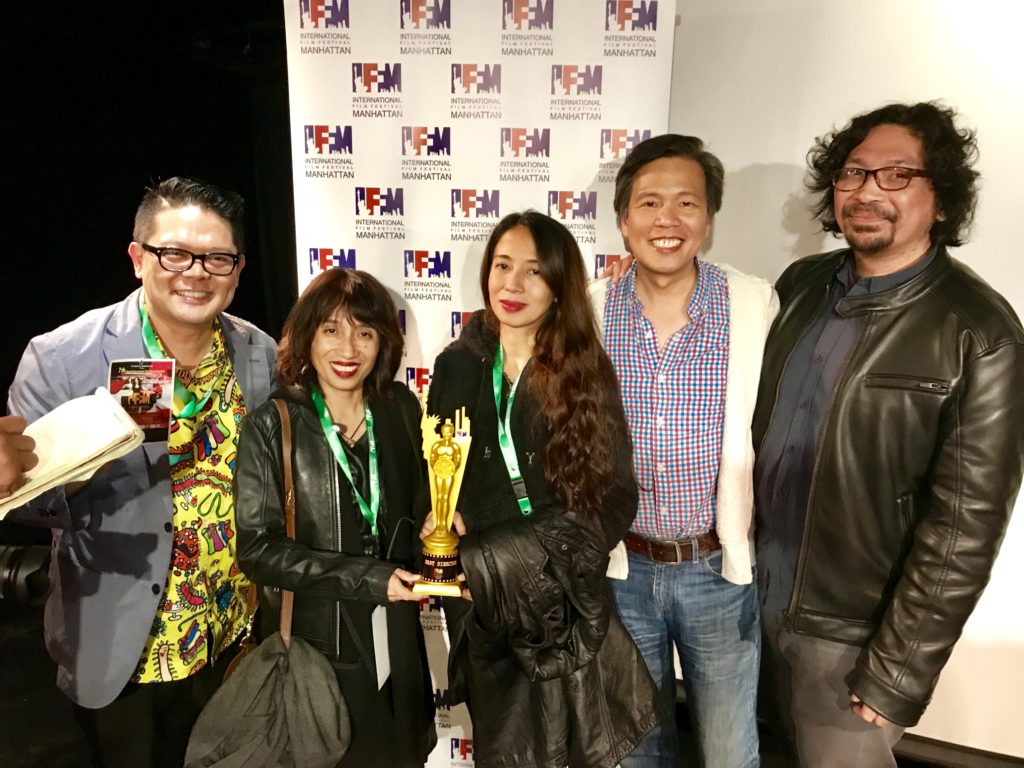Dalena sisters bag Best Director award at 7th Int’l Film Festival Manhattan

Sari Dalena (left) with her younger sister, Kiri, holding their Best Director trophy at the 7th International Film Festival Manhattan (IFFM). INQUIRER/Anthony Advincula
NEW YORK—When Philippine Pres. Ferdinand Marcos declared Martial Law, on Sept. 21, 1972, Sari Raissa Dalena was just a toddler learning how to walk. Her younger sister, Kiri, had not yet been born at the time.
But raised by parents who are National Artists and surrounded by people with liberal views, the Dalena sisters’ lives were intimately woven around political activism and social justice.
At home, they grew up hearing names of influential and controversial Filipino figures of the Martial Law era such as Benigno Aquino Jr., Gen. Fabian Ver and Jose Maria Sison aka Joma, the founding father of the Communist Party of the Philippines.
Last Sunday, October 22, the sisters bagged the Best Director Award at the 7th International Film Festival Manhattan, besting entries from countries around the world. Their 135-minute film “The Guerilla Is a Poet,” a compelling hybrid of documentary and cinematic drama about the life of Sison and his wife, Julie de Lima, was the festival’s closing-night screening at the Producers Club Theater in midtown Manhattan.
“This is an eye-opening piece, hoping to enlighten those who are part of the new generation — those who only knew what happened before and during the Martial Law through old photos and stories,” Kiri said.
Sari and Kiri have multiple accolades under their belts. They are highly regarded in Philippine independent cinema and are certainly not new to films that tackle war, oppression, brutality and upheavals.
But what makes “The Guerilla Is a Poet” unique and remarkable, against the backdrop of heart-tugging cinematography, lyrical narratives and stark yet quaint characterizations, is how much access they had to Sison and De Lima. The sisters convinced the activist couple to trust them and open up about their turbulent life- story as revolutionaries and about how they live now, in their late 70s, in a foreign land.

From left, Luis Pedron, executive director of IFFM; Sari and Kiri Dalena, directors; Anthony Advincula, correspondent; and Keith Sicat, Sari’s husband and fellow filmmaker. CONTRIBUTED
“First of all, we were very fortunate that Sison was pretty much open to be interviewed,” said Sari. “We were able to ask him a lot of hard questions, no holds barred. “We were able to capture him in very vulnerable moments, especially the dynamics with his wife.”
In October 1988, while Sison was on a speaking tour in Europe, Pres. Corazon Aquino canceled his Philippine passport. Since then he and his wife have lived in exile. And ever since, except for rare interviews and short media appearances, no one had had the opportunity to give a more intimate and a much closer look at the couple’s private lives in the Netherlands, where they have lived for nearly three decades.
Yet, in 2009, the Dalenas received a big surprise, an opportunity that they could not pass up. While Sari and her husband, fellow filmmaker Keith Sicat, were at the 2009 Rotterdam International Film Festival for the screening of her documentary, “Memories of a Forgotten War,” they got an invitation from someone to meet with Filipinos based in Utrecht. They agreed to meet at the train station.
“It turned out it was Joma Sison inviting me, and he wanted to talk about the possibility of making a documentary about his life,” Sari said. “Of course, we agreed to do it because he is a big part of Philippine history.”
Much to her chagrin, Sari was surprised that Sison had already Filipino celebrities in his mind. “He was suggesting Cesar Montano or Richard Gomez, [big actors in the Philippine cinema],” Sari said.
“At one point,” Kiri added, “he wanted his character to be played by Dingdong Dantes,” a well-known young Filipino actor and commercial model.
Little did they know, however, the hurdle to find a producer to fund the film would not be easy to overcome.
“You know, at one point, he was the ‘Most Wanted Person’ in the Philippines,” Sari said, “and so the network did not want to be associated with him or communism.”
Three years later, as they prepared the script and cemented the funding source, Kiri traveled alone to the Netherlands and began filming.
“It was hard because I was the only one who went to interview him and his wife,” she said. “I had to do the camera work, the sound, the interviews. Alone, there was no one who would assist me, except Joma Sison himself.”
Kiri admitted that, during their first meeting, Sison and De Lima were apprehensive about interviewing them in their own home. They didn’t want to show any parts of their apartment, and Sison also refused to show on camera his old shoes.
“They wanted it to be in another area, but I had to explain it to them that it was better to do the interviews in a space that they are most comfortable in,” Kiri added. “Finally, they relented and allowed me to visit them every day.”
And because of full access that Sison and De Lima had given to her, allowing to interact regularly with both of them, Kiri said that it sparked ideas to alter the original script of the film.
“The perspective of the film had changed in the process. At first, [the protagonist] was primarily Joma,” she said. “Then I saw the wife was a dominant figure, so I thought that she should also be a primary character in the film.”
Kiri described De Lima as “quiet but a force, a very powerful influence” on Sison.
The movie is poignant, closely detailed and personal, most particularly when it shows symbolic images: a small portrait of Mao Zedong hanging on the white wall of Sison’s home, the books that the couple read were neatly stacked on the shelf, their front yard that had just been freshly snowed in, and the birthday party hosted for them by their Filipino friends.
When “The Guerilla Is a Poet,” which has a similar title as Sison’s poem written in 1968, was premiered at the 2013 CineFilipino Film Festival in Manila, it won four major awards: Best Actor, Best Editing, Best Music and Best Photography.
The film casts include young actors Karl Medina and Angeli Bayani as Joma and Julie, along with Raymond Bagatsing, Anthony Falcon, Bong Cabrera and Chanel Latorre as their fellow activists. Willie Nepomuceno portrays the character of Pres. Marcos, and Jao Mapa as Benigno Aquino, Jr.
“It is important for filmmakers to question the past,” Sari said. “There are many ways that we could explore our history and learn from it.”

